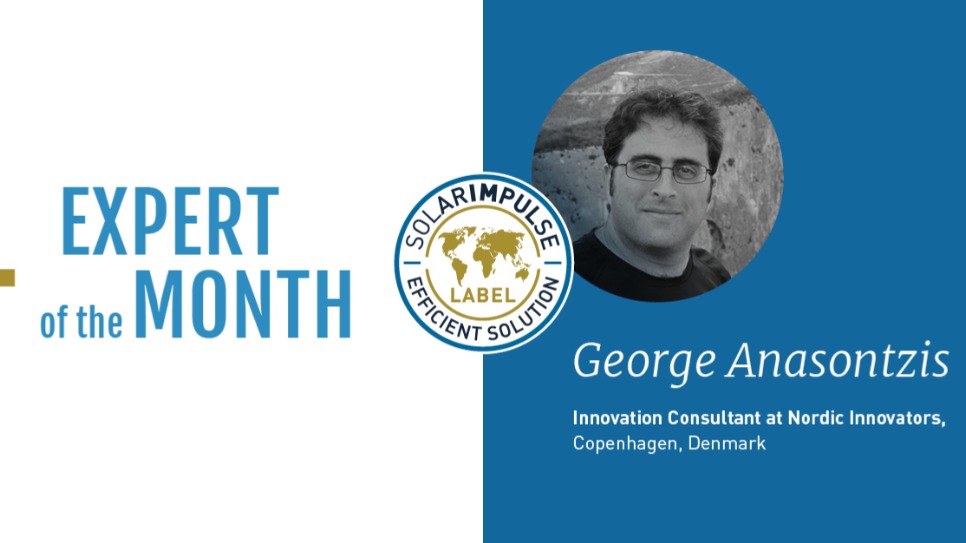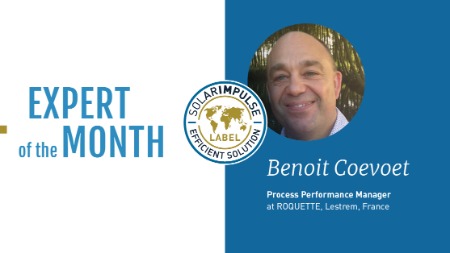Interviews - April 3, 2023
April's Expert of the Month: George Anasontzis!


Written by Olivia Mahaux 3 min read
At the heart of the Solar Impulse Foundation is our Expert Community, a vital network of professionals who evaluate Solutions seeking the Efficient Solution Label and promote the global adoption of clean and profitable technologies. Our Experts bring diverse backgrounds in science, engineering, and consulting, with representation from over 50 countries. Each month, we honor an exceptional member of the community, and we are very pleased to recognize George Anastontzis as April's Expert of the Month.
April's Expert of the Month: George Anasontzis!
Since joining our Expert Community in 2020, George has evaluated 19 Solutions, impressing us with his insightful assessments and unwavering dedication to supporting the Foundation's mission and initiatives.
This article will explore George's professional background and expertise.
Please tell us a bit about yourself!
I live in the Copenhagen area, in Denmark. I am originally from Greece. I have a BSc in Biology, a MSc and a PhD in microbial biotechnology, and a Master’s in business administration with an emphasis on bioentrepreneurship and open innovation. I have several years of experience as a consultant, while currently I am employed by Nordic Innovators P/S.
Could you share a few details about your activity as a consultant and how it’s linked to sustainability?
My activities as a freelance consultant and in EviKrets Biobased Processes Consultants have been linked to technical and strategic consultancy within industrial and environmental biotechnology, agricultural bioinnovation, alternative protein, fermentation, business development, and commercialisation of research results. Currently, at Nordic Innovators, I focus on providing support to companies, universities, and institutions that are looking for soft funding opportunities to develop, scale up, and commercialise their technology. All these activities are in the sphere of sustainability and open innovation, as they are all connected to various stages of the green transition value chain.
How do you stay up-to-date with the latest research and advancements in biotechnologies, and how do you incorporate that knowledge into your consulting services?
I would say that following curated media is an important source of up-to-date information on advancements in relation to scientific knowledge and knowledge related to commercialisation of biotechnology research. Evaluation activities, whether that is for manuscripts or for research proposals also help staying updated, as well as talking with scientists and strategists directly. Still, there are many opportunities that require more in-depth investigation of state-of-the-art scientific research using scientific publications as a source of information. As an innovation consultant at Nordic Innovators, but also previously, that knowledge is being used as the benchmark to identify, evaluate, and extend the innovation potential of the companies or projects I am working on.
In what ways could bio innovation contribute to sustainability, and what are some of the obstacles to the integration of biotechnologies in this effort?
Bioinnovation has a huge potential to contribute to sustainability and to rewire the way we do many things in our lives. From chemical production, remediation, crop protection, and biodegradable bioplastics to carbon capture, waste valorisation, alternative protein, and climate change adaptation of our food production system. One of the major challenges though is the technology upscale and the high operational and capital expenses related to biological processes. Depending on the application and the relevant regulations, these challenges could prove too tough to deal with… yet. Other challenges I find relevant are setting proper standards to control greenwashing, developing business models that would allow bio innovation to also benefit low- and middle-income parts of society, and dealing with the enormous infrastructure required to bring bio innovation to the market.
With your expertise in precision fermentation, how do you see this field of precision fermentation evolving in the coming years, and what are some of the most promising applications for this technology?
The field is growing rapidly, despite the hypes (e.g. when a technology becomes exceptionally fashionable) and the lows (e.g. when the competition has a much lower cost). But overall, there is an upwards trend that provides investments for new technologies and products to be developed. We must ensure that other aspects catch up with that growth, such as knowledge on the tech upscaling, supportive policies and increased fermentation capacity. Personally, I hope to see more in the fields of waste valorisation, plastic substitution and plastic waste management, and in the green transition of current biochemical production, incl. fragrances and animal proteins.
In 2020, what inspired you to join the Expert Community of the Solar Impulse Foundation?
Joining the Expert Community was an opportunity to contribute to the labeling of Solutions that provide opportunities in our path towards sustainability, also addressing issues such as scalability and profitability.
What are your expectations for the future of Labeled Solutions, as well as the Solar Impulse Foundation as a whole?
I would expect for the Labeled Solutions to expand geographically even more, and maybe even support and promote Solutions that are coming from or are to be applied in emerging economies. The Solar Impulse Foundation could thus support these economies in their green transition and their adaptation to climate change, which is as important to them as it is to us.
Anything else you would like to add or share?
It has been a pleasure working with the Solar Impulse Foundation, for the Solutions evaluation and all the other activities I have been involved in at the Foundation.

Written by Olivia Mahaux on April 3, 2023


